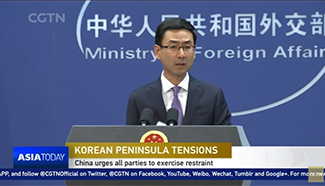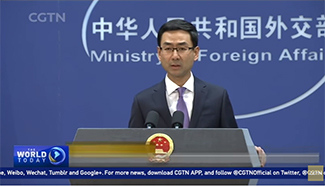SYDNEY, Feb. 15 (Xinhua) -- A "sugar tax" could prolong the lives of Australians by more than two years, researchers have found.
Modelling undertaken by the University of Melbourne's Centre for Public Health Policy concluded that taxing foods that are high in sugar, salt and saturated fats would save Australia 2.6 billion U.S. dollars in public healthcare costs every year.
The study, published in the Public Library of Science (PLOS) on Wednesday, also suggested that fruit and vegetables should be subsidized by the government.
"The study suggests that taxes and subsidies on foods and beverages can potentially be combined to achieve substantial improvements in population health and cost savings to the health sector," the study said.
"The modelling illustrates the potentially large benefits of combining food taxes and subsidies for improving population health and reducing health sector spending."
A tax on sugar alone would add 1.2 years to the life of an average Australian, the study found, while a combination of taxes and subsidies would mean people would live for 2.1 years longer.
The report used data from a number of Australian sources and employed models from Denmark, New Zealand, the United Kingdom and the United States to measure how customers would behave when prices fluctuated.
"This is a feasible intervention," Tony Blakely, the report's co-author, told the Australian Broadcasting Corporation (ABC) on Wednesday.
Under the modelling, foods were taxed based on the units of sugar, saturated fats and salt they contained.
"Some foods that had all - high salt, high sugar, high saturated fat - would have a bigger price increase than those that had, say, just saturated fat, but not high sugar or salt," Blakely said.
Saturated fats were taxed at a rate of 1.05 U.S. dollars per 100 grams, excess salt at 23 U.S. cents per gram, sugar-sweetened beverages at 36 U.S. cents per litre while fruits and vegetables were subsidised at a rate of 10 U.S. cents per 100 grams.
Under the tax rates used, the price of a common chocolate bar would increase by 10 percent while the cost of a kilogram of apples fell by 25 percent.
"You need to include both carrots and sticks to change consumer behavior and to encourage new taxes," Blakely told the Guardian Australia on Wednesday.
"That's where this paper is cutting edge internationally."
"We have worked out the whole package of taxes with minimal impact on the budget of the household, so you can see an overall gain for the government. The government would be less interested in the package if it was purely punitive, but this provides subsidies and savings to health spending that could be reinvested back into communities and services."
He said that taxing junk foods would prompt manufacturers to change their products so they were healthier.
"For those who might say this is an example of nanny state measures, let's consider that we don't mind asbestos being taken out of buildings to prevent respiratory disease, and we're happy for lead to be taken from petrol. We need to change the food system if we are going to tackle obesity and prevent disease."
Geoff Parker from the Australian Beverage Council described the proposal as "a new Goods and Services Tax."
"It's really disappointing that in 2017, the only solution being put forward to address a complex problem like obesity is tax, then another tax, then another tax," Parker told the ABC.
"We need to be having a smarter dialogue around how to address the nation's expanding waistline."














